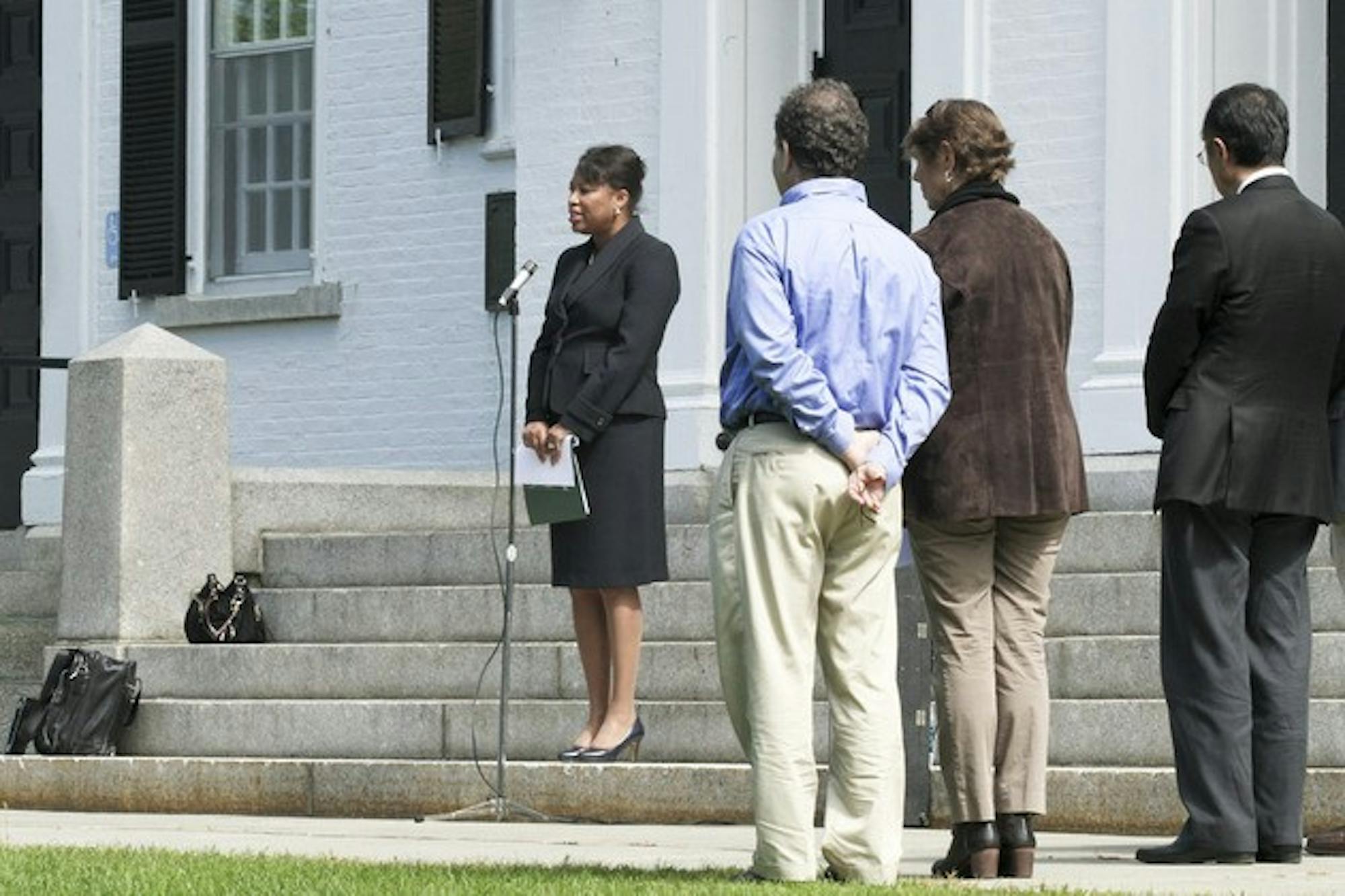The tribute began with a tolling of the Baker Tower bells at 12:15 p.m. As the sound of the chiming faded, Dean of the College Charlotte Johnson shared her reflections on the "unthinkable" tragedy with the crowd outside Dartmouth Hall. Although the attacks were indisputably tragic, Johnson said, they also produced a sense of unity that arose immediately after the misfortune.
"If there was any good to come out of the 9/11 tragedy, it is that, for a time, we all remembered that we are brothers and sisters, we are interconnected, and we all share the same faith," Johnson said. "My hope as we leave here today is for a renewed sense of community, a renewed sense of brotherhood and sisterhood, the type of community that makes Dartmouth what it is, and makes our nation so great."
Johnson read the names of the 12 members of the Dartmouth community who were killed in the attacks, before leading attendees in a moment of silence. The group began to disband by 12:19 p.m.
Following her speech, Johnson observed that the anniversary was particularly emotional due to the ways in which it felt similar to Sept. 11, 2001.
"One of the things that strikes me about today is that it is a hauntingly similar day, in terms of the weather and the same sense that fall is coming that was actually there on the day of," Johnson said in an interview with The Dartmouth. "It was a beautiful fall day. It just seems a little bit uncanny."
In addition to the memorial service, Dartmouth commemorated the 10th anniversary of the attacks through an online video series featuring various community members' reflections on the terrorist attacks. A new video was released on the Dartmouth Now website each day from Monday, Sept. 5 through Sunday, Sept. 11.
In the first video, former Treasury Secretary Henry Paulson Jr. '68 recalled hearing of the attacks during a phone call with his chief of staff while Paulson was on a plane bound for China. At the time, Paulson was the chief executive officer of Goldman Sachs. Since Goldman Sachs' offices were located near the World Trade Center, Paulson said he could hear through the phone his employees screaming at the sight of the attacks.
Although civilian flights to New York stopped after Sept. 11, Paulson was allowed to return with a military escort in order to help re-start the markets in the aftermath of the attacks. While the attacks were a "horrendous" experience, "you also saw the very best of humanity" in the aftermath, Paulson said.
The second video in the series featured a conversation between the College's Director of Media Relations Justin Anderson and Michael Arad '91, who designed Reflecting Absence, the World Trade Center Site Memorial. The memorial was intended to create a sense of introspection and to contrast with the typically bustling nature of New York City, according to Arad.
In another video, Samantha Azinge '12, a Brooklyn native who was in the sixth grade at the time of the attacks, shared her story of walking home with her brother and seeing survivors coated in debris traveling from Manhattan.
Dartmouth Medical School professor James Geiling recalled returning to the Pentagon's medical clinic to direct recovery efforts just hours after the attack. He credited the clinic's preparation drills for the "heroic" way in which his staff responded to the crisis.
The Sept. 11 terrorist attacks claimed the lives of 10 Dartmouth graduates: Juan P. Cisneros '99, Christopher M. Colasanti '90, Kevin R. Crotty '80, Brian P. Dale '80 Tu'81, Joseph Flounders '77, Jeffrey E. LeVeen '68, Frederick C. Rimmele III '97, Richard H. Woodwell '79, Thomas F. Theurkauf Jr. Tu'81 and Kevin P. Connors Tu'73.
Paul W. Ambrose, who served on the Dartmouth Medical School staff from 1996 to 1999, and Ginger Risco Nelson, wife of health policy professor Bill Nelson, also died in the attacks.




